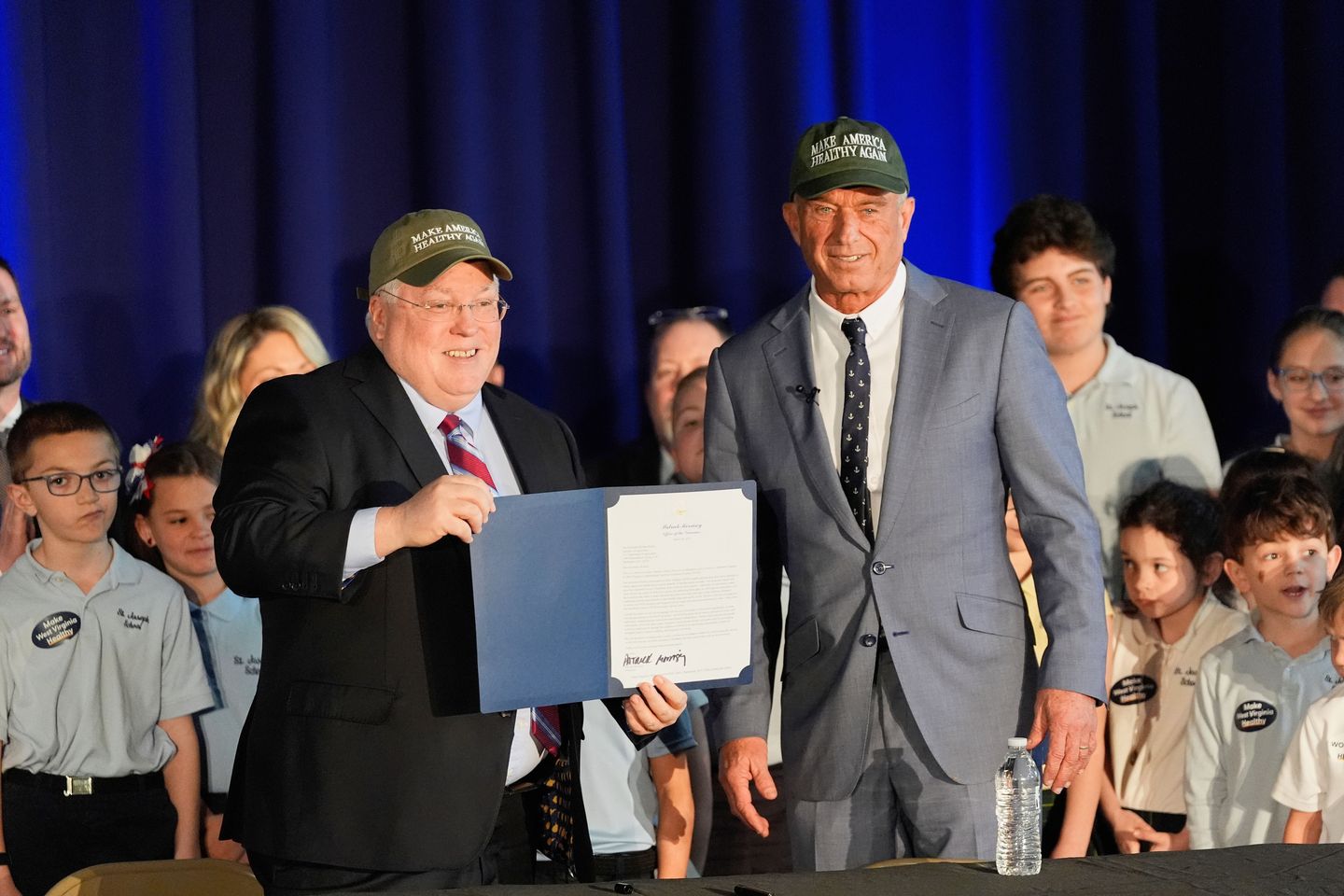
Health and Human Services Secretary Robert F. Kennedy Jr. said Friday that states will be granted waivers to ban soda from the federal food stamp program.
West Virginia on Friday began implementing Mr. Kennedy’s “Make America Healthy Again” agenda, announcing it will seek permission to block food stamp recipients in the state from using their benefits to purchase sugary sodas and will increase the program’s work and educational training requirements.
Mr. Kennedy appeared in Martinsburg alongside West Virginia Gov. Patrick Morrisey. Mr. Kennedy announced he would sign waivers permitting the state to become the first in the nation to enforce new standards for the food stamp program, formally called the Supplemental Nutrition Assistance Program or SNAP.
“The message that I want to give to the country today and to all the other governors is get in line behind Governor Morrissey and apply for a waiver to my agency, and we’re going to give it to you. That’s the way we’re going to win this,” Mr. Kennedy said.
Mr. Kennedy’s main mission at the department is to improve the health of Americans amid a disease and obesity epidemic that he believes is caused in part by unhealthy diets.
Mr. Kennedy’s department does not oversee the SNAP program. It falls under the U.S. Department of Agriculture. USDA Secretary Brooke Rollins backs Mr. Kennedy’s belief that SNAP should not be paying for food that is making people fatter and sicker.
Ms. Rollins was not present at the Martinsburg event but said in a statement she backs the West Virginia plan.
“Governor Morrisey is a visionary, and willing to cut through the D.C. noise to help families move toward healthier behaviors and healthier outcomes,” Ms. Rollins said. “I look forward to receiving Governor Morrisey’s SNAP pilot request and will work swiftly to make certain West Virginia is equipped with the technical assistance and expertise to move forward. I thank him for being a true partner. Together, we will make America great and healthy again!”
Mr. Morrisey said the waivers he seeks will block food stamp recipients from using their benefits to purchase soda. He will also seek permission from the federal government to expand work training and educational requirements for those in the state who receive SNAP money.
“I think we can all agree work is good, work is moral and it helps us be stronger in the mind and body and we need more of that right here in West Virginia,” Mr. Morrisey said. “Outside of limited exceptions, if you have the ability to work, you should.”
Mr. Morrisey did not provide details on how he will seek to expand the work and educational training requirements.
Under current law, SNAP recipients aged 16-59 who are able-bodied are generally required to work or participate in a government-approved skills and training program.
The federal food stamp program serves roughly 42 million people at an annual cost of $113 billion.
In West Virginia, 277,400 people, or one in six residents, received SNAP benefits in 2024, according to the West Virginia Center on Budget and Policy.
Mr. Morrisey said he’s seeking help “to realign SNAP so that good food choices are easier to make if taxpayers are paying for it.”
The governor did not provide details about those additional changes to SNAP.
West Virginia has the nation’s highest adult obesity rate at 41.2%, according to the Robert Wood Johnson Foundation. The foundation said adult obesity rates exceed 35% in 23 states.
The USDA, however, has never granted waivers to exclude sugary foods from SNAP, despite numerous requests over the years from states seeking to eliminate unhealthy food from the benefits program.
Mr. Kennedy said the policy is about to change.
He said sugar was “just as addictive as crack and almost as bad for you.” He compared soda companies to the formerly dominant tobacco companies and said they are pressuring governors to back off from efforts to ban the drinks from the SNAP program.
“They are telling them that they are going to stop writing checks, that they are going to run people against them, that they are going to destroy their political careers,” Mr. Kennedy said.
Congress is trying to force sugary foods out of SNAP programs nationwide through new legislation.
Rep. Josh Brecheen, Oklahoma Republican, introduced legislation that would prevent food stamps from being used to purchase soda, candy, ice cream and other sugary treats.
For now, the USDA appears poised to go along with the waivers.
Shortly after taking the helm of USDA, Ms. Rollins sent a letter to states outlining her vision for the department’s nutrition programs. She pledged her support for “state innovation through approvals of waivers and pilot projects” and strategies “to encourage healthy choices, healthy outcomes and healthy families.”
A USDA spokesperson did not immediately respond to an inquiry about Mr. Morrisey’s waiver requests.
Earlier this week, Mr. Morrisey implemented another Kennedy MAHA initiative, signing legislation banning several red, yellow, blue and green food dyes from school lunches and in food items sold within the state.
Mr. Kennedy recently asked the FDA to close a loophole that allowed food companies to use some dyes and chemicals without FDA review and met with food industry leaders to request they remove artificial color additives.
Mr. Morrisey said he hopes the new law banning food dyes in West Virginia “is going to lead to a broader national discussion and FDA action so we can have more consistent policies across the nation.”
The governor also announced a statewide initiative urging West Virginia residents to walk a mile every day. Mr. Morrisey admitted he’s made poor food choices and failed to exercise but now plans to “lead by example” and “make the hard choices to get healthier.”
He’s asked Mr. Kennedy to serve as his personal trainer.
“He hasn’t said yes yet, but I think he’s sizing me up as a major renovation project,” Mr. Morrisey said.

















